2024成都中考英语试题研究 一、人与自我 (八)勤于动手,乐于实践 知识精练(课件)(共29张PPT)
文档属性
| 名称 | 2024成都中考英语试题研究 一、人与自我 (八)勤于动手,乐于实践 知识精练(课件)(共29张PPT) |  | |
| 格式 | pptx | ||
| 文件大小 | 1.7MB | ||
| 资源类型 | 教案 | ||
| 版本资源 | 通用版 | ||
| 科目 | 英语 | ||
| 更新时间 | 2023-12-22 22:37:15 | ||
图片预览

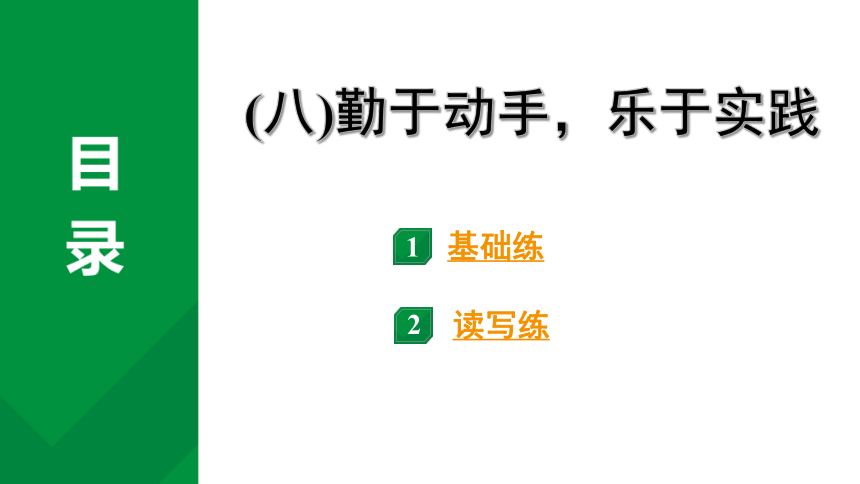
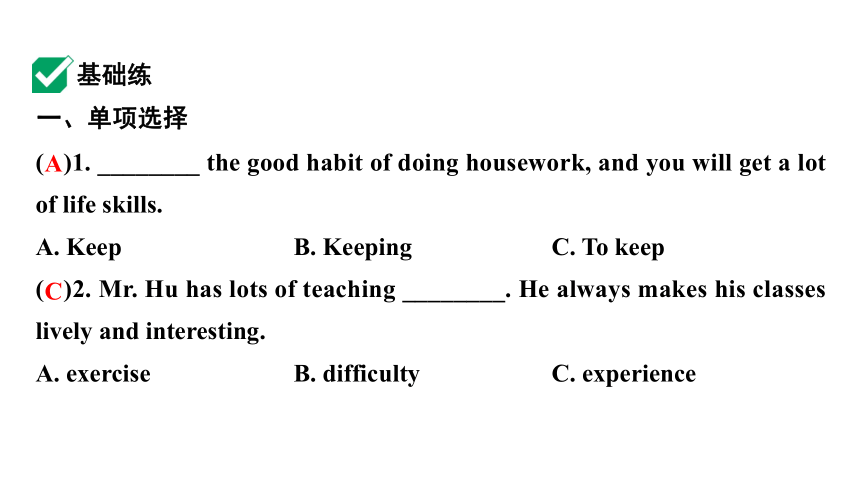
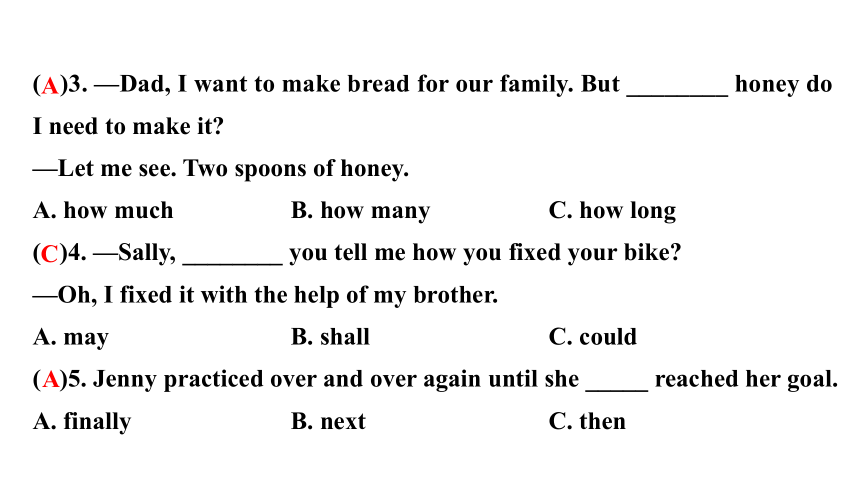
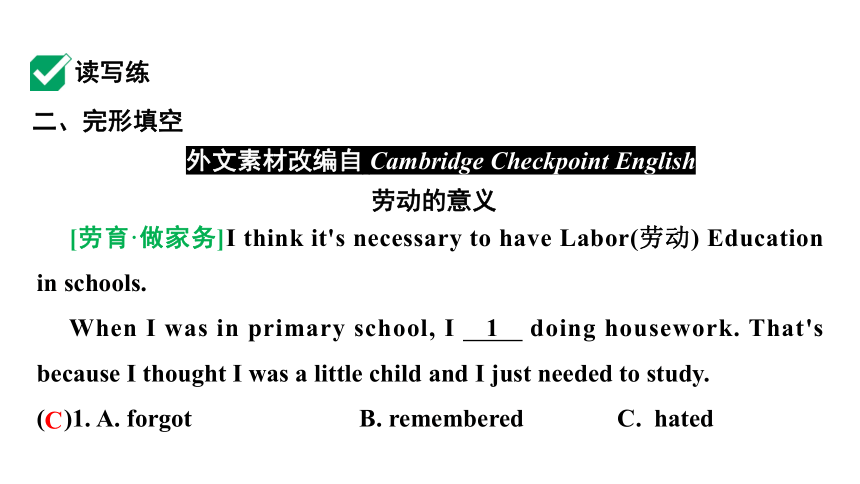
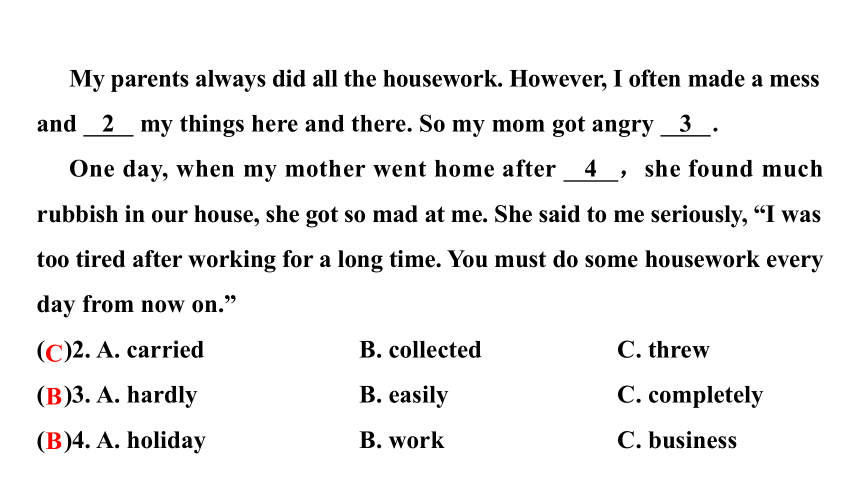
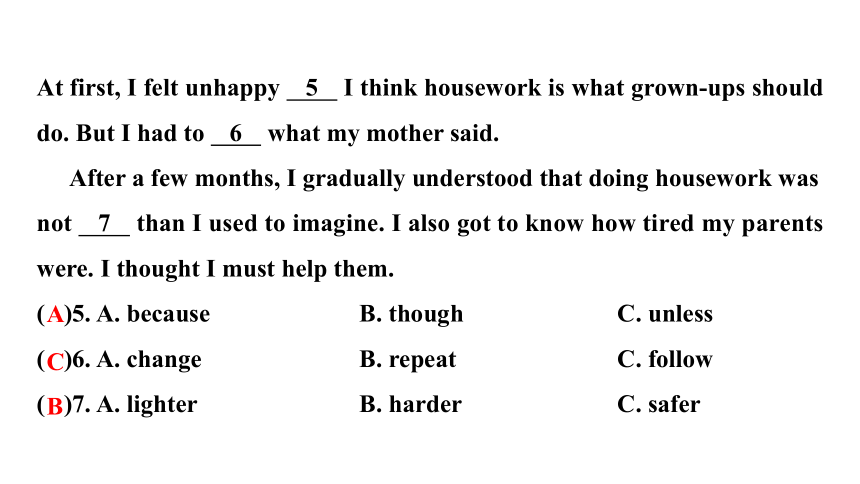
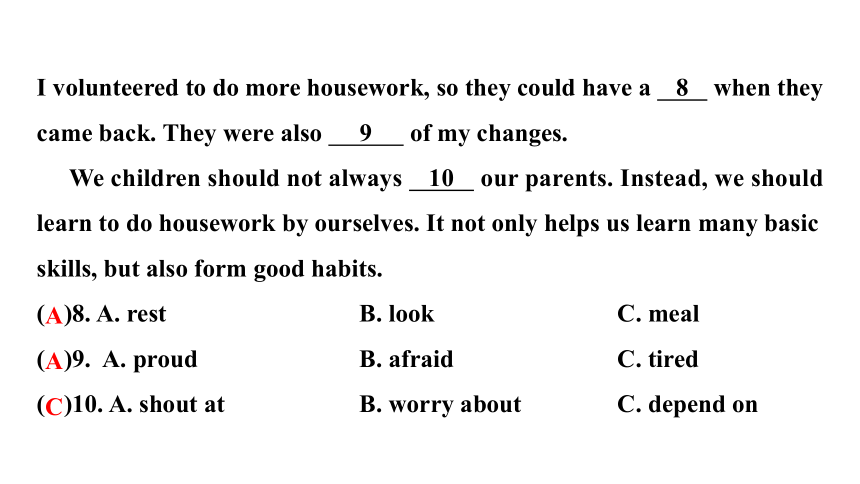
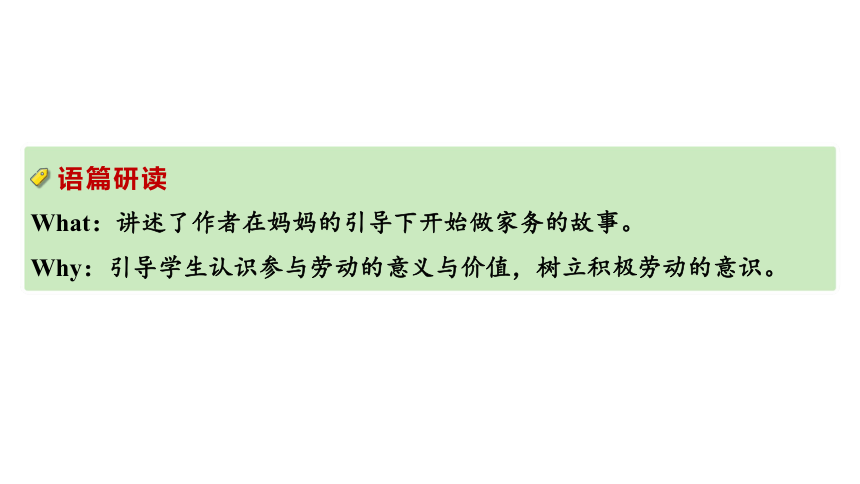
文档简介
(共29张PPT)
人与自我
一
(八)勤于动手,乐于实践
1
基础练
读写练
2
基础练
一、单项选择
( )1. ________ the good habit of doing housework, and you will get a lot of life skills.
A. Keep B. Keeping C. To keep
( )2. Mr. Hu has lots of teaching ________. He always makes his classes lively and interesting.
A. exercise B. difficulty C. experience
A
C
( )3. —Dad, I want to make bread for our family. But ________ honey do I need to make it
—Let me see. Two spoons of honey.
A. how much B. how many C. how long
( )4. —Sally, ________ you tell me how you fixed your bike
—Oh, I fixed it with the help of my brother.
A. may B. shall C. could
( )5. Jenny practiced over and over again until she _____ reached her goal.
A. finally B. next C. then
A
C
A
读写练
二、完形填空
[劳育·做家务]I think it's necessary to have Labor(劳动) Education in schools.
When I was in primary school, I 1 doing housework. That's because I thought I was a little child and I just needed to study.
( )1. A. forgot B. remembered C. hated
外文素材改编自 Cambridge Checkpoint English
劳动的意义
C
My parents always did all the housework. However, I often made a mess and 2 my things here and there. So my mom got angry 3 .
One day, when my mother went home after 4 ,she found much rubbish in our house, she got so mad at me. She said to me seriously, “I was too tired after working for a long time. You must do some housework every day from now on.”
( )2. A. carried B. collected C. threw
( )3. A. hardly B. easily C. completely
( )4. A. holiday B. work C. business
C
B
B
At first, I felt unhappy 5 I think housework is what grown ups should do. But I had to 6 what my mother said.
After a few months, I gradually understood that doing housework was not 7 than I used to imagine. I also got to know how tired my parents were. I thought I must help them.
( )5. A. because B. though C. unless
( )6. A. change B. repeat C. follow
( )7. A. lighter B. harder C. safer
C
A
B
I volunteered to do more housework, so they could have a 8 when they came back. They were also 9 of my changes.
We children should not always 10 our parents. Instead, we should learn to do housework by ourselves. It not only helps us learn many basic skills, but also form good habits.
( )8. A. rest B. look C. meal
( )9. A. proud B. afraid C. tired
( )10. A. shout at B. worry about C. depend on
A
A
C
语篇研读
What:讲述了作者在妈妈的引导下开始做家务的故事。
Why:引导学生认识参与劳动的意义与价值,树立积极劳动的意识。
语篇研读
How:①文体特征:记叙文。
②作者对做家务的态度变化:讨厌做家务→当妈妈让“我”每天做家务时感到不开心→意识到做家务并没有那么简单 →开始帮助父母做更多的家务。
③写作手法:文章先提出观点,然后以自身的事件举例来支撑观点, 增强文章的可读性。五育并举、中华优秀传统文化、跨文化、社会主义先进文化为近年来中考趋势性主题,特设更多主题语篇补充训练。
. .
三、选择型阅读理解
[劳育·烹饪]
语篇研读
What:介绍了 Molly在劳动课上学会了做西红柿炒鸡蛋,并且分享了做 西红柿炒鸡蛋的步骤。
Why:引导学生提高动手实践能力,学习基本的生活技能,促进全面发展。
语篇研读
How:①文体特征:应用文。
②写作手法:以操作指南的形式呈现烹饪步骤,图文结合,引起学生的阅读兴趣,增加了文章的可读性。
③语言特点:文章使用了一些动词,如“Cut”,“Beat”,“mix”,“Pour”等,来介绍Molly做西红柿炒鸡蛋的过程。
. . . .
. . . .
( )1. What does Molly think of cooking
A. Simple. B. Boring. C. Interesting.
( )2. How long do the eggs take to turn golden when cooking
A. About 10 seconds.
B. About 30 seconds.
C. About 2 minutes.
C
C
( )3. [句子排序] Which of the following is the correct order of the story
①Pour the beaten eggs into the wok.
②Cut some tomatoes and green onions into pieces.
③Add some green onions onto the dish.
④Add the tomato pieces and stir fry them.
A. ②→①→③→④ B. ②→①→④→③ C. ①→②→③→④
B
( )4. What can we learn from the passage
A. All the food should be put at the same time.
B. We should cook the tomatoes over a low heat.
C. We need three kinds of foods to cook the dish.
( )5. Where is the passage probably from
A. A cooking guide. B. A science report. C. A fashion magazine.
C
A
四、短文填空
I threw away the letter to my grandmother into the bin. We'd moved to the city this past winter when Mom 1. __________ a new job, and I missed Grandma very much.
外文素材改编自 Reach HIGHER
社区花园
but explain feel flower good offer quiet reason understand wait want wonder
was offered
But I couldn't send her another letter to tell her how unhappy I was because she was 2. ________ to know that I had finally gotten used to my new place all the time.
“Willa Jean,” Mom called, “you can put on your oldest clothes and a jacket and come with me.” The words made me stop being sad. Mom had been so busy with her new job that I wasn't sure she had noticed my 3. __________.
but explain feel flower good offer quiet reason understand wait want wonder
waiting
feeling(s)
Three blocks later, we arrived at a place where several of our neighbors were already there. It was hard 4. __________________ why everyone was standing on a dirty soil(土地). Our neighbor, Mr. Himura, 5. __________ that the government had given us some tools as an incentive (激励) to clean up the soil and start a community garden. The government's only request was that we gave away part of the food from our garden to the city's food bank for the poor.
but explain feel flower good offer quiet reason understand wait want wonder
to understand
explained
“It sounds like a lot of hard work,” Mom said, 6. ____ I was excited. Working in the garden with Grandma had always been our special and 7. __________ time together. And I missed digging in the soil and watering those 8. ________ we planted.
“What should we plant?” Mom asked. “Tomatoes,” I answered. Grandma had always made the 9. ______ sandwiches from the tomatoes in her garden.
but explain feel flower good offer quiet reason understand wait want wonder
but
wonderful
flowers
best
“I miss those sandwiches,” Mom said 10. __________,“and I miss Grandma, too.” I hugged her. Maybe this garden would grow a new connection between us.
but explain feel flower good offer quiet reason understand wait want wonder
quietly
语篇研读
What:讲述了作者将对奶奶的思念转换为园艺劳动的故事。
Why:引导学生积极主动参与劳动。
How:①文体特征:记叙文。
②语言特点:文章通过使用一些带有情感色彩的形容词,如“special”,“wonderful”等表达出作者对于与奶奶共处的美好时光的怀念;此外,通过重复使用“miss”这一动词,表现出作者对于奶奶强烈的思念。
五、完成图表
Water is important to us. Many people, especially Chinese, like drinking boiled water. But it is not easy to drink the cold boiled water at once. 2题Although you can cool it through fans or natural wind, it takes you much time to do it.
1题When you cool water through a fan or natural wind, the influence of the wind on water is increased. This will help you to lower the temperature of water.
But do you know a simple device(装置) that can cool hot water
Some students from a middle school made it! Now imagine that you pour hot tea into a cup and then put it on the table to wait for natural cooling. 3题The special way to cool hot water is almost like that.
Here is how the device works. 4题After the water is boiled, pour it into the device. The special structure(结构) inside the device will turn the water into many little water drops, and the low pressure boiling inside the device will speed up the cooling of water.
People use the hot water cooling device to make it more quickly to get a cup of water for drinking.
250ml of water can be cooled from nearly 100℃ to about 50℃ for drinking within one or two minutes. 5题However, its speed is also greatly influenced by the environment. If the humidity(湿度) is too high, the speed will be greatly influenced. For example, when the amount of water molecules(水分子) in the air is too large, it will be harder to cool down the boiled water.
The hot water cooling device can be used when you stay at home, in the office or when you travel, which can conveniently solve the problem of hot water cooling and save much time for you to wait.
语篇研读
What:介绍了一个由中学生发明的热水冷却装置。
Why:激发学生对科学的兴趣和探索的欲望,鼓励学生勤于动手、敢于创新。
语篇研读
How:①文体特征:说明文。
②写作手法:采用了举例子、列数字的说明方法,详细讲解了热水冷却设备的工作原理和冷却效果,帮助读者客观全面地了解该装置。
③语言特点:使用了大量的动词、名词和数词,如“cooling,device,structure,humidity,molecules,250ml,100℃”等,帮助读者更加 精确、客观地理解文章内容。
. . .
. . .
1. lower
2. spend
3. special
4. boiled water
5. wet
人与自我
一
(八)勤于动手,乐于实践
1
基础练
读写练
2
基础练
一、单项选择
( )1. ________ the good habit of doing housework, and you will get a lot of life skills.
A. Keep B. Keeping C. To keep
( )2. Mr. Hu has lots of teaching ________. He always makes his classes lively and interesting.
A. exercise B. difficulty C. experience
A
C
( )3. —Dad, I want to make bread for our family. But ________ honey do I need to make it
—Let me see. Two spoons of honey.
A. how much B. how many C. how long
( )4. —Sally, ________ you tell me how you fixed your bike
—Oh, I fixed it with the help of my brother.
A. may B. shall C. could
( )5. Jenny practiced over and over again until she _____ reached her goal.
A. finally B. next C. then
A
C
A
读写练
二、完形填空
[劳育·做家务]I think it's necessary to have Labor(劳动) Education in schools.
When I was in primary school, I 1 doing housework. That's because I thought I was a little child and I just needed to study.
( )1. A. forgot B. remembered C. hated
外文素材改编自 Cambridge Checkpoint English
劳动的意义
C
My parents always did all the housework. However, I often made a mess and 2 my things here and there. So my mom got angry 3 .
One day, when my mother went home after 4 ,she found much rubbish in our house, she got so mad at me. She said to me seriously, “I was too tired after working for a long time. You must do some housework every day from now on.”
( )2. A. carried B. collected C. threw
( )3. A. hardly B. easily C. completely
( )4. A. holiday B. work C. business
C
B
B
At first, I felt unhappy 5 I think housework is what grown ups should do. But I had to 6 what my mother said.
After a few months, I gradually understood that doing housework was not 7 than I used to imagine. I also got to know how tired my parents were. I thought I must help them.
( )5. A. because B. though C. unless
( )6. A. change B. repeat C. follow
( )7. A. lighter B. harder C. safer
C
A
B
I volunteered to do more housework, so they could have a 8 when they came back. They were also 9 of my changes.
We children should not always 10 our parents. Instead, we should learn to do housework by ourselves. It not only helps us learn many basic skills, but also form good habits.
( )8. A. rest B. look C. meal
( )9. A. proud B. afraid C. tired
( )10. A. shout at B. worry about C. depend on
A
A
C
语篇研读
What:讲述了作者在妈妈的引导下开始做家务的故事。
Why:引导学生认识参与劳动的意义与价值,树立积极劳动的意识。
语篇研读
How:①文体特征:记叙文。
②作者对做家务的态度变化:讨厌做家务→当妈妈让“我”每天做家务时感到不开心→意识到做家务并没有那么简单 →开始帮助父母做更多的家务。
③写作手法:文章先提出观点,然后以自身的事件举例来支撑观点, 增强文章的可读性。五育并举、中华优秀传统文化、跨文化、社会主义先进文化为近年来中考趋势性主题,特设更多主题语篇补充训练。
. .
三、选择型阅读理解
[劳育·烹饪]
语篇研读
What:介绍了 Molly在劳动课上学会了做西红柿炒鸡蛋,并且分享了做 西红柿炒鸡蛋的步骤。
Why:引导学生提高动手实践能力,学习基本的生活技能,促进全面发展。
语篇研读
How:①文体特征:应用文。
②写作手法:以操作指南的形式呈现烹饪步骤,图文结合,引起学生的阅读兴趣,增加了文章的可读性。
③语言特点:文章使用了一些动词,如“Cut”,“Beat”,“mix”,“Pour”等,来介绍Molly做西红柿炒鸡蛋的过程。
. . . .
. . . .
( )1. What does Molly think of cooking
A. Simple. B. Boring. C. Interesting.
( )2. How long do the eggs take to turn golden when cooking
A. About 10 seconds.
B. About 30 seconds.
C. About 2 minutes.
C
C
( )3. [句子排序] Which of the following is the correct order of the story
①Pour the beaten eggs into the wok.
②Cut some tomatoes and green onions into pieces.
③Add some green onions onto the dish.
④Add the tomato pieces and stir fry them.
A. ②→①→③→④ B. ②→①→④→③ C. ①→②→③→④
B
( )4. What can we learn from the passage
A. All the food should be put at the same time.
B. We should cook the tomatoes over a low heat.
C. We need three kinds of foods to cook the dish.
( )5. Where is the passage probably from
A. A cooking guide. B. A science report. C. A fashion magazine.
C
A
四、短文填空
I threw away the letter to my grandmother into the bin. We'd moved to the city this past winter when Mom 1. __________ a new job, and I missed Grandma very much.
外文素材改编自 Reach HIGHER
社区花园
but explain feel flower good offer quiet reason understand wait want wonder
was offered
But I couldn't send her another letter to tell her how unhappy I was because she was 2. ________ to know that I had finally gotten used to my new place all the time.
“Willa Jean,” Mom called, “you can put on your oldest clothes and a jacket and come with me.” The words made me stop being sad. Mom had been so busy with her new job that I wasn't sure she had noticed my 3. __________.
but explain feel flower good offer quiet reason understand wait want wonder
waiting
feeling(s)
Three blocks later, we arrived at a place where several of our neighbors were already there. It was hard 4. __________________ why everyone was standing on a dirty soil(土地). Our neighbor, Mr. Himura, 5. __________ that the government had given us some tools as an incentive (激励) to clean up the soil and start a community garden. The government's only request was that we gave away part of the food from our garden to the city's food bank for the poor.
but explain feel flower good offer quiet reason understand wait want wonder
to understand
explained
“It sounds like a lot of hard work,” Mom said, 6. ____ I was excited. Working in the garden with Grandma had always been our special and 7. __________ time together. And I missed digging in the soil and watering those 8. ________ we planted.
“What should we plant?” Mom asked. “Tomatoes,” I answered. Grandma had always made the 9. ______ sandwiches from the tomatoes in her garden.
but explain feel flower good offer quiet reason understand wait want wonder
but
wonderful
flowers
best
“I miss those sandwiches,” Mom said 10. __________,“and I miss Grandma, too.” I hugged her. Maybe this garden would grow a new connection between us.
but explain feel flower good offer quiet reason understand wait want wonder
quietly
语篇研读
What:讲述了作者将对奶奶的思念转换为园艺劳动的故事。
Why:引导学生积极主动参与劳动。
How:①文体特征:记叙文。
②语言特点:文章通过使用一些带有情感色彩的形容词,如“special”,“wonderful”等表达出作者对于与奶奶共处的美好时光的怀念;此外,通过重复使用“miss”这一动词,表现出作者对于奶奶强烈的思念。
五、完成图表
Water is important to us. Many people, especially Chinese, like drinking boiled water. But it is not easy to drink the cold boiled water at once. 2题Although you can cool it through fans or natural wind, it takes you much time to do it.
1题When you cool water through a fan or natural wind, the influence of the wind on water is increased. This will help you to lower the temperature of water.
But do you know a simple device(装置) that can cool hot water
Some students from a middle school made it! Now imagine that you pour hot tea into a cup and then put it on the table to wait for natural cooling. 3题The special way to cool hot water is almost like that.
Here is how the device works. 4题After the water is boiled, pour it into the device. The special structure(结构) inside the device will turn the water into many little water drops, and the low pressure boiling inside the device will speed up the cooling of water.
People use the hot water cooling device to make it more quickly to get a cup of water for drinking.
250ml of water can be cooled from nearly 100℃ to about 50℃ for drinking within one or two minutes. 5题However, its speed is also greatly influenced by the environment. If the humidity(湿度) is too high, the speed will be greatly influenced. For example, when the amount of water molecules(水分子) in the air is too large, it will be harder to cool down the boiled water.
The hot water cooling device can be used when you stay at home, in the office or when you travel, which can conveniently solve the problem of hot water cooling and save much time for you to wait.
语篇研读
What:介绍了一个由中学生发明的热水冷却装置。
Why:激发学生对科学的兴趣和探索的欲望,鼓励学生勤于动手、敢于创新。
语篇研读
How:①文体特征:说明文。
②写作手法:采用了举例子、列数字的说明方法,详细讲解了热水冷却设备的工作原理和冷却效果,帮助读者客观全面地了解该装置。
③语言特点:使用了大量的动词、名词和数词,如“cooling,device,structure,humidity,molecules,250ml,100℃”等,帮助读者更加 精确、客观地理解文章内容。
. . .
. . .
1. lower
2. spend
3. special
4. boiled water
5. wet
同课章节目录
